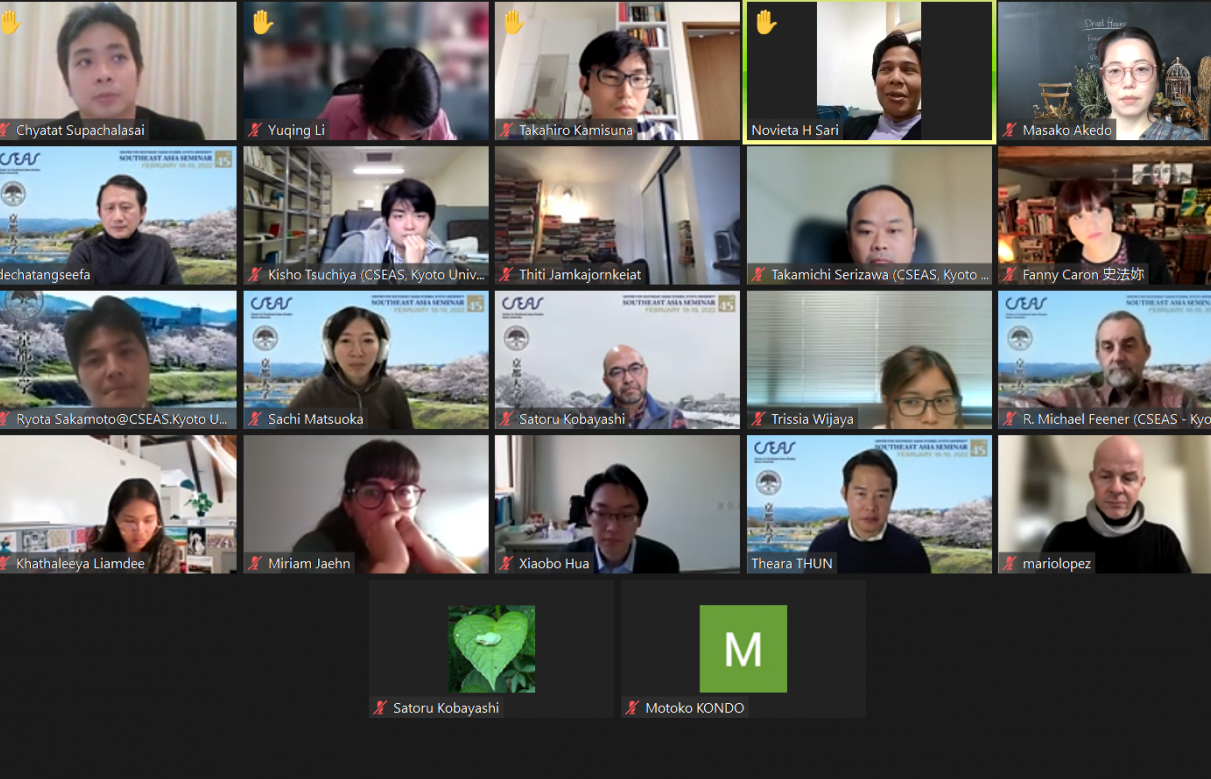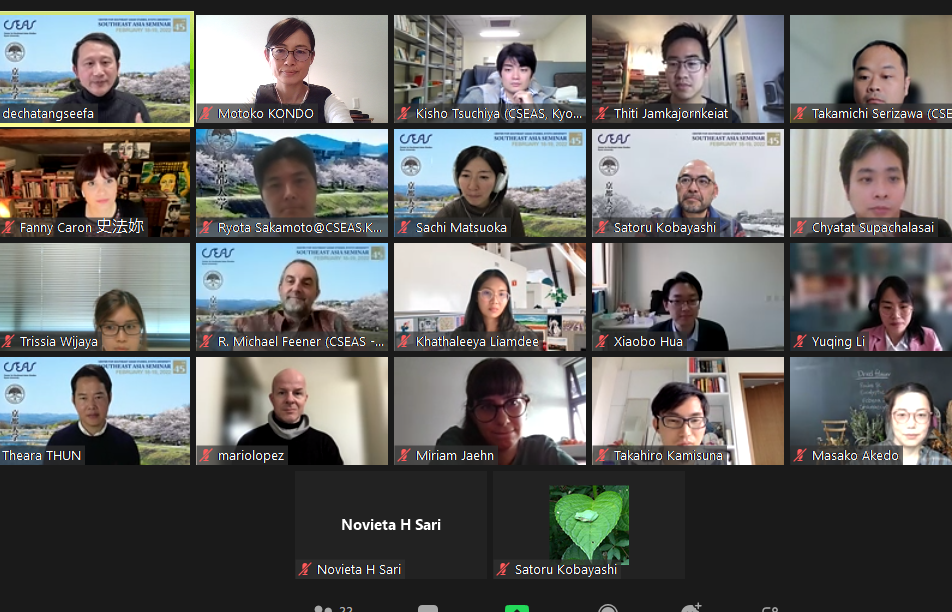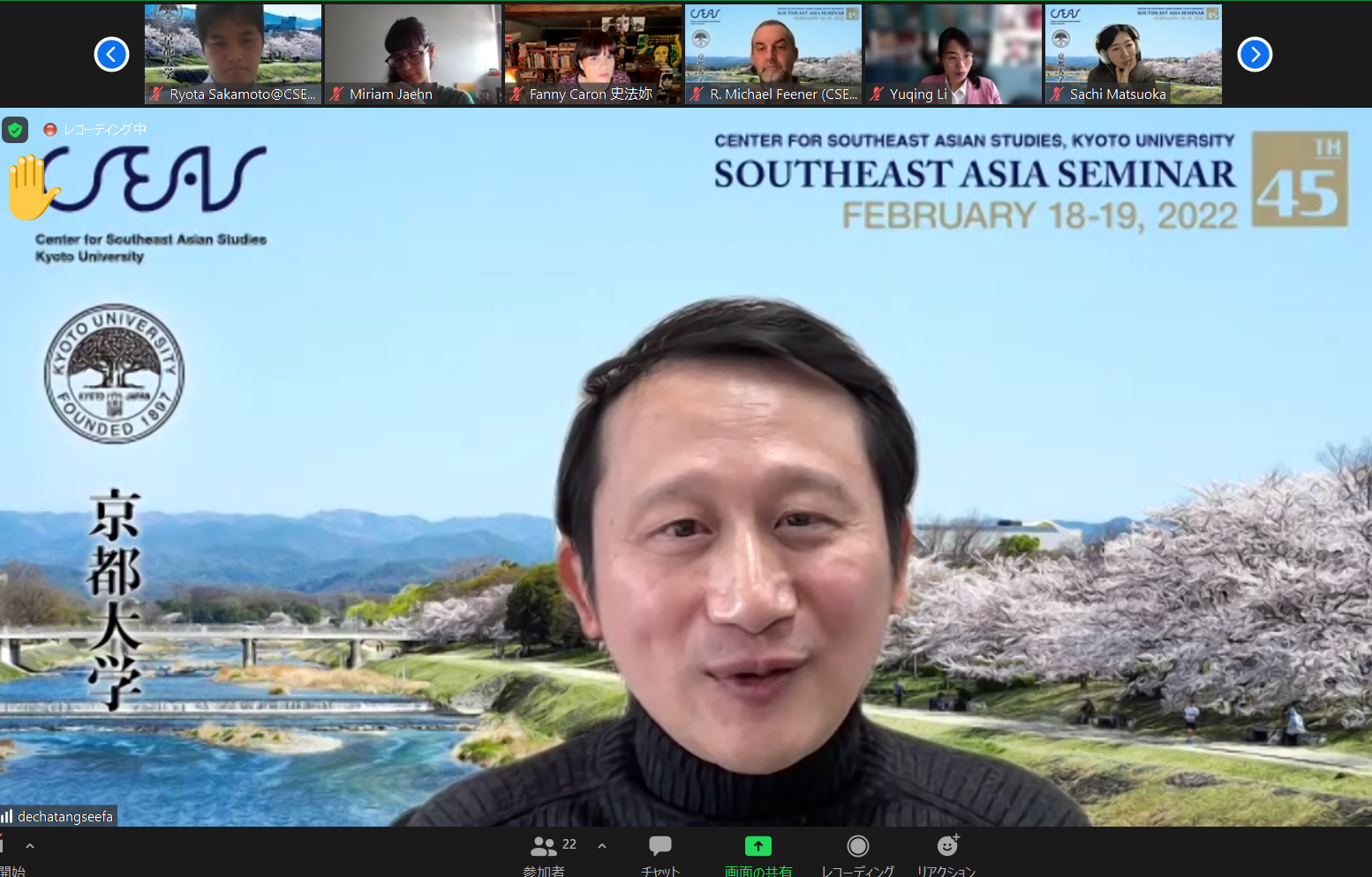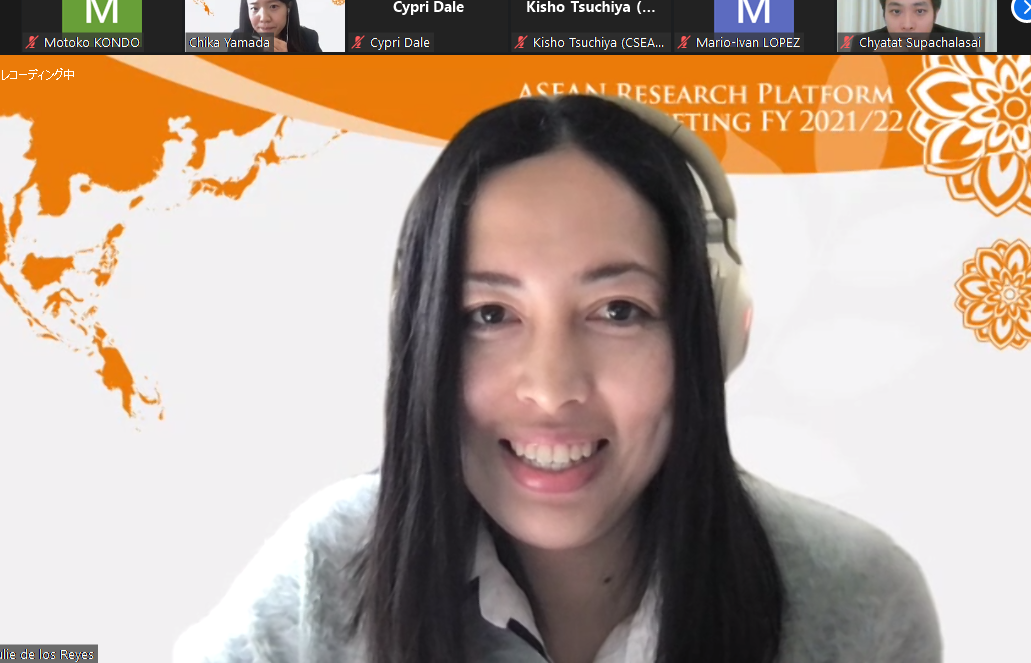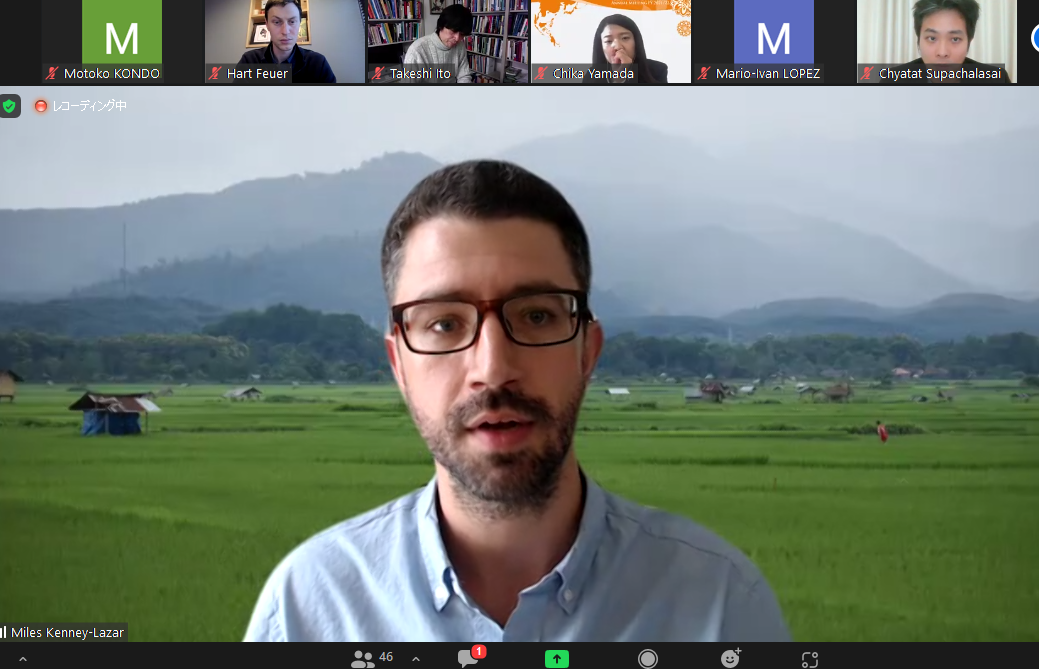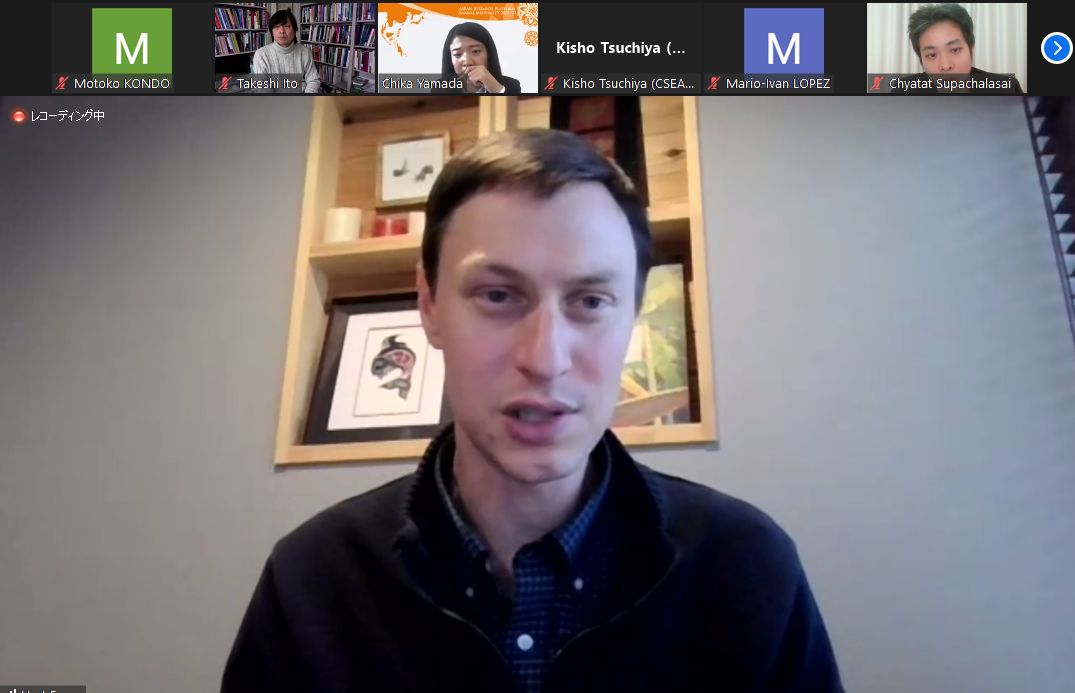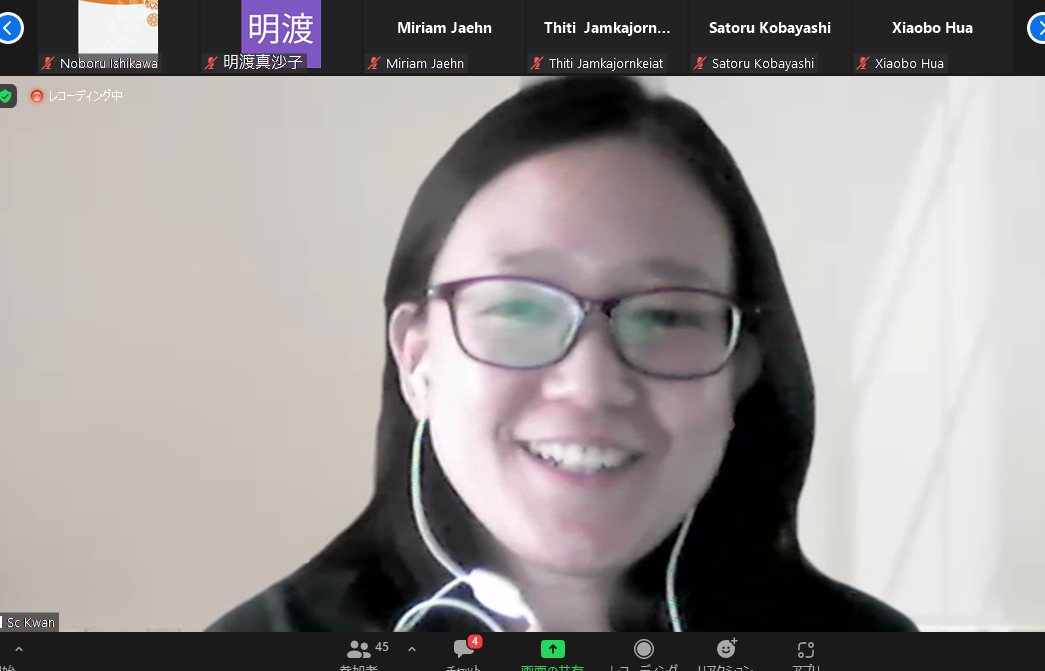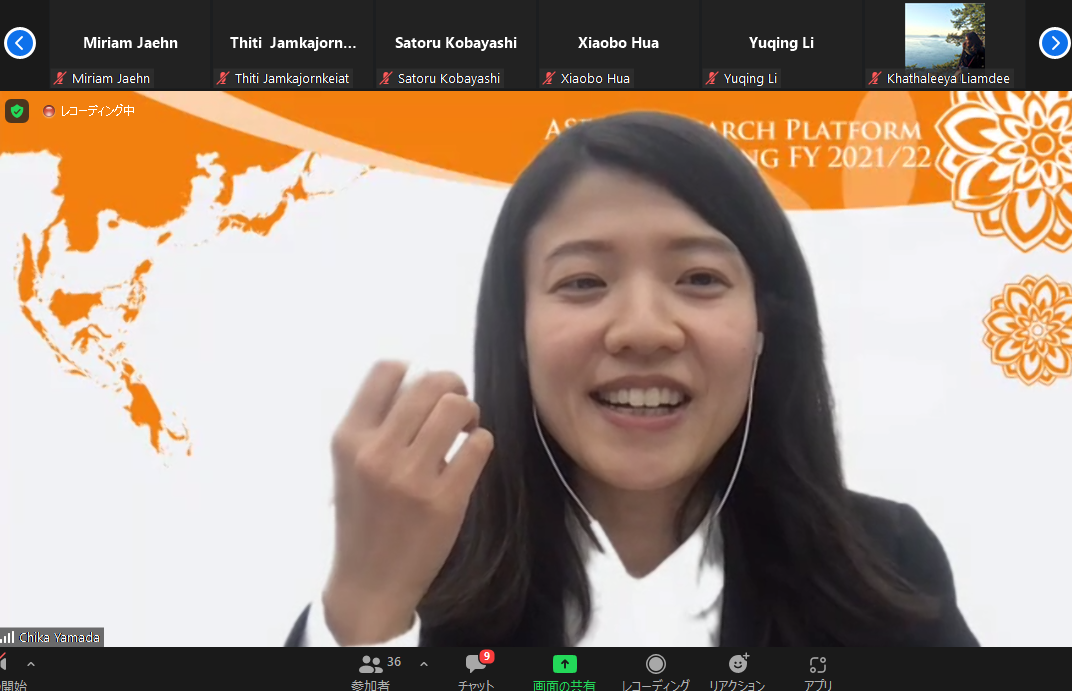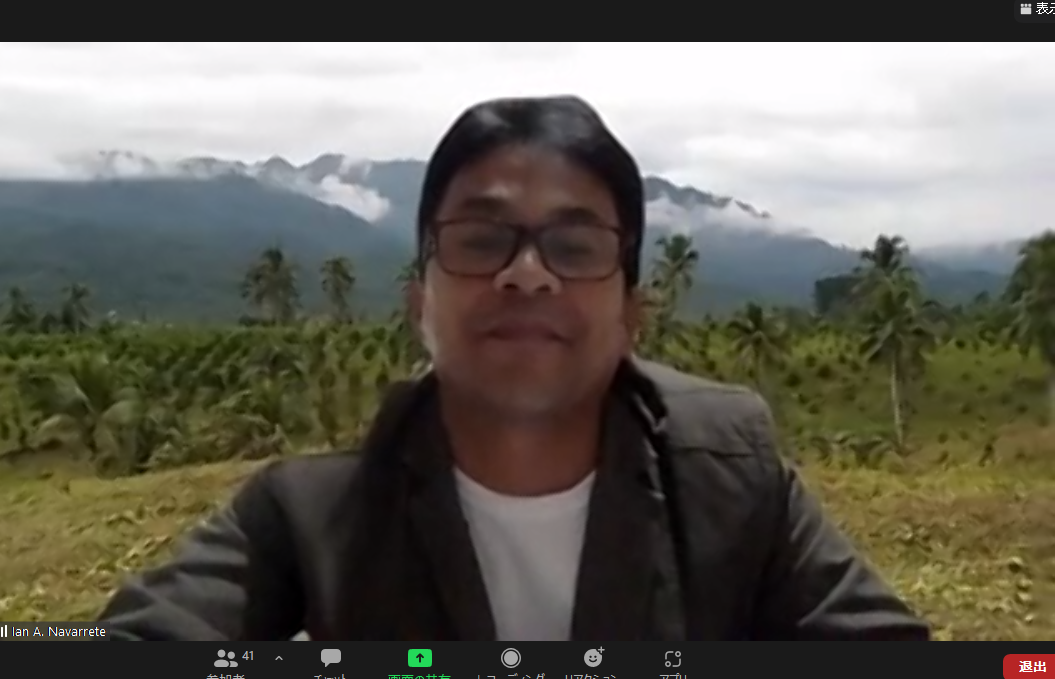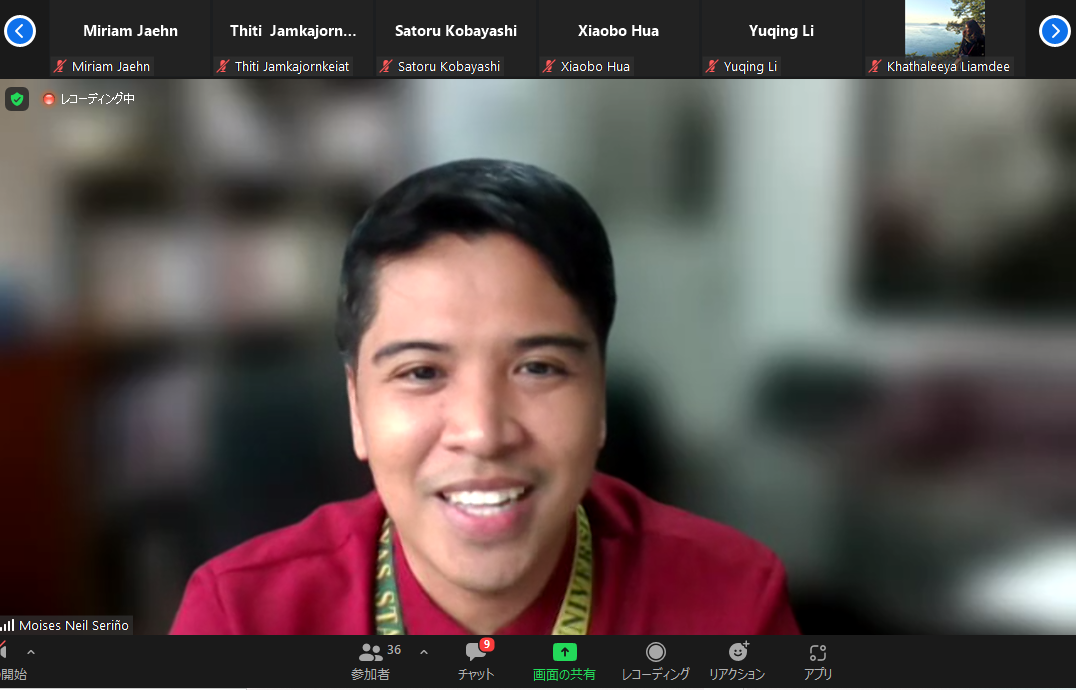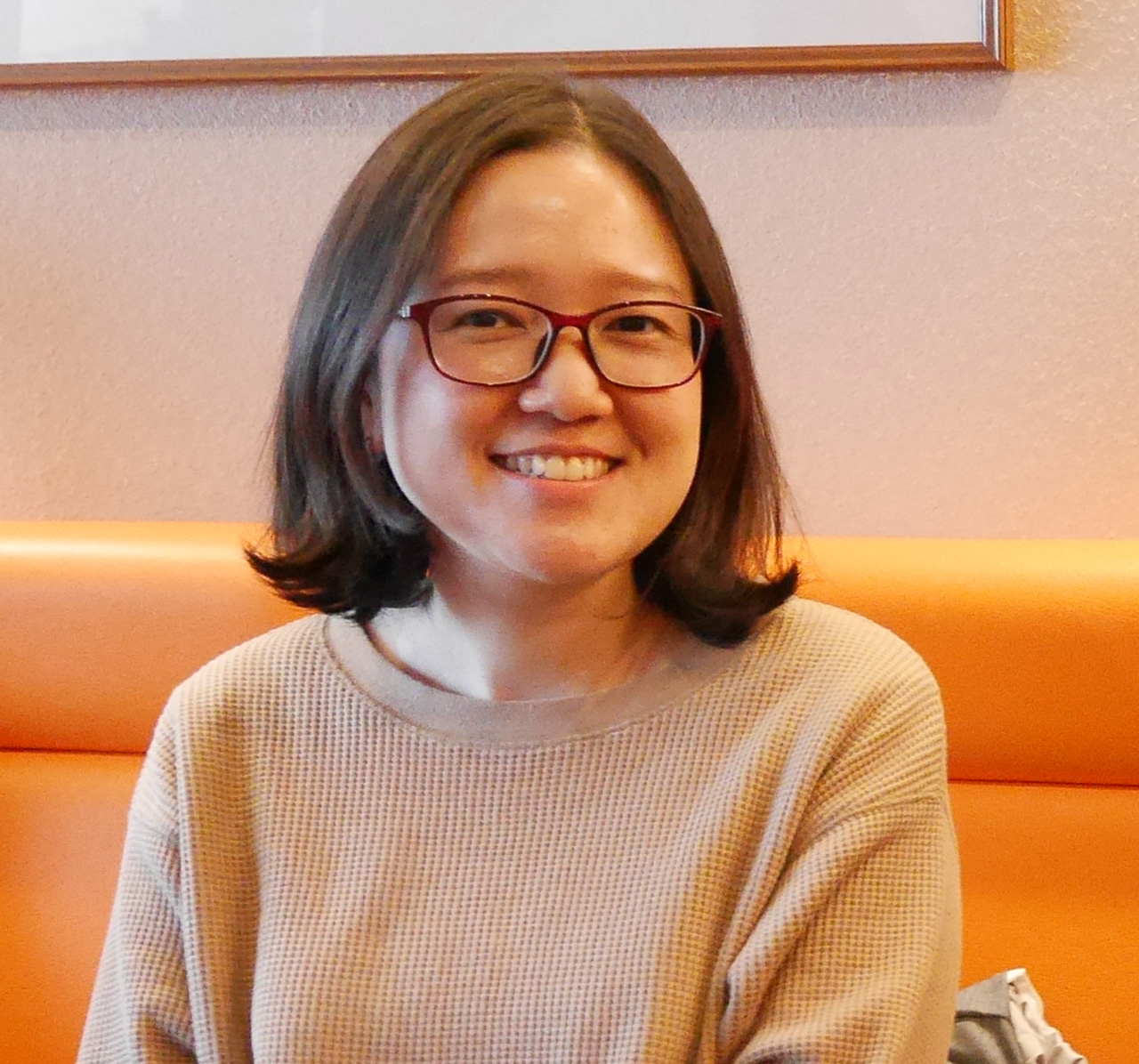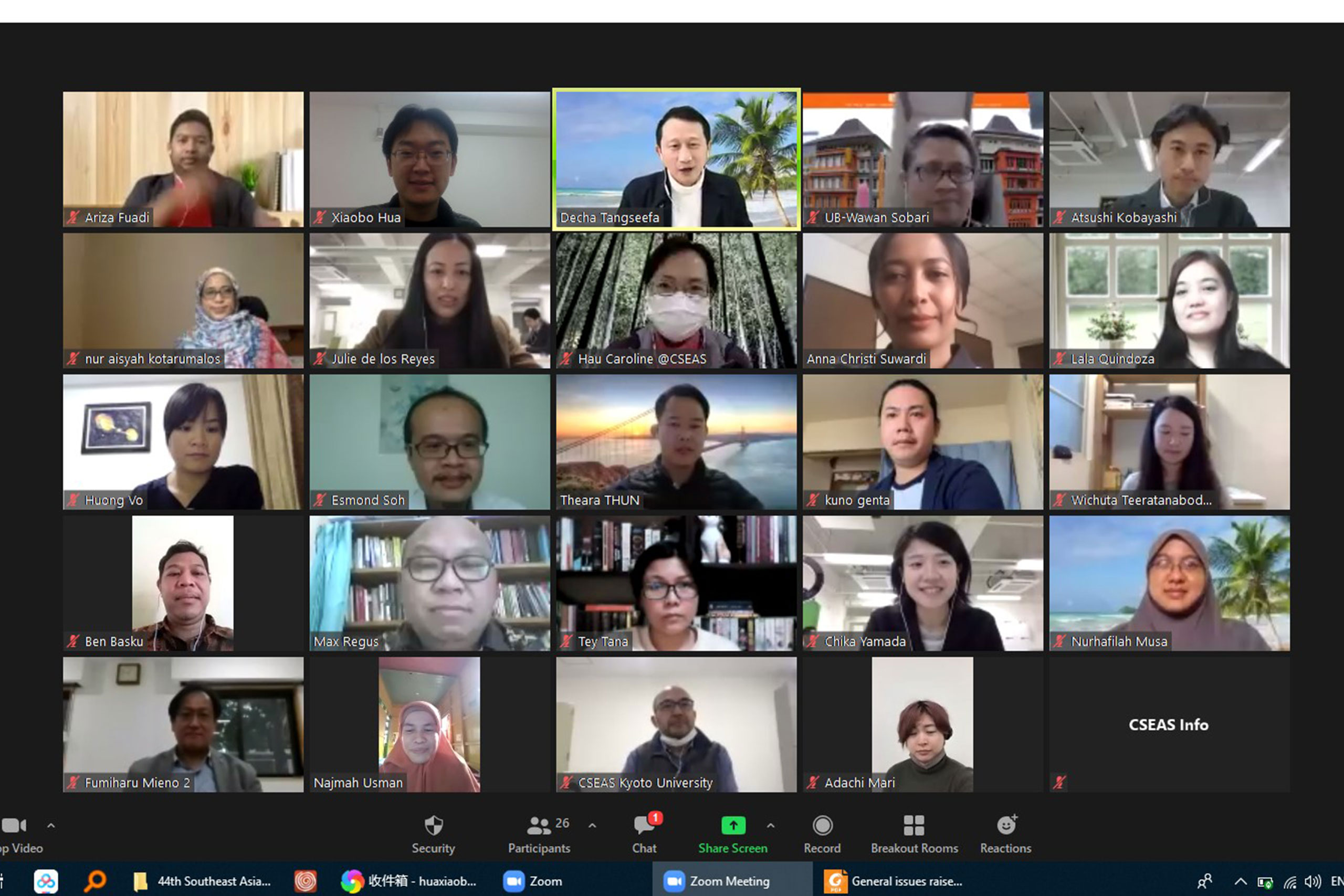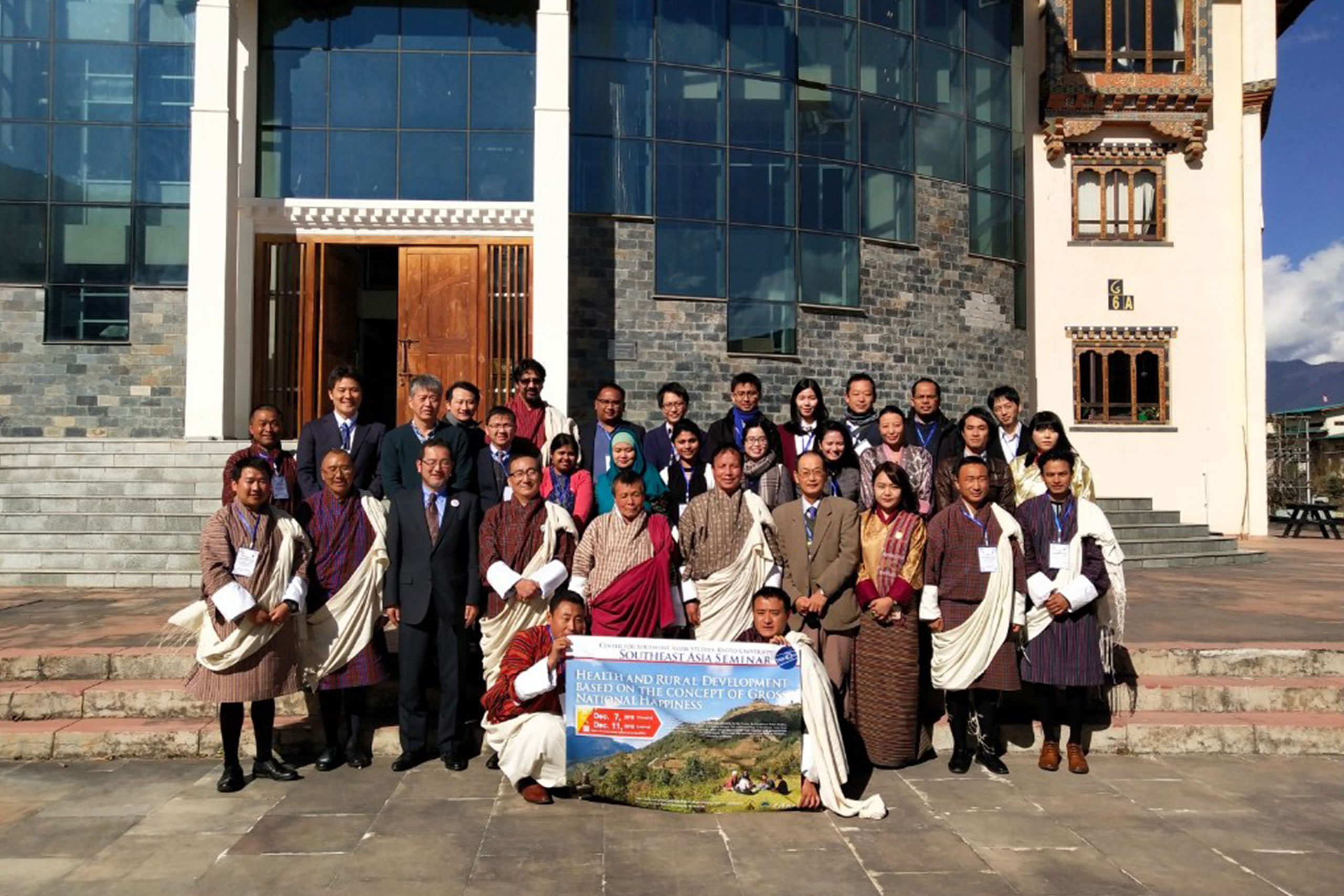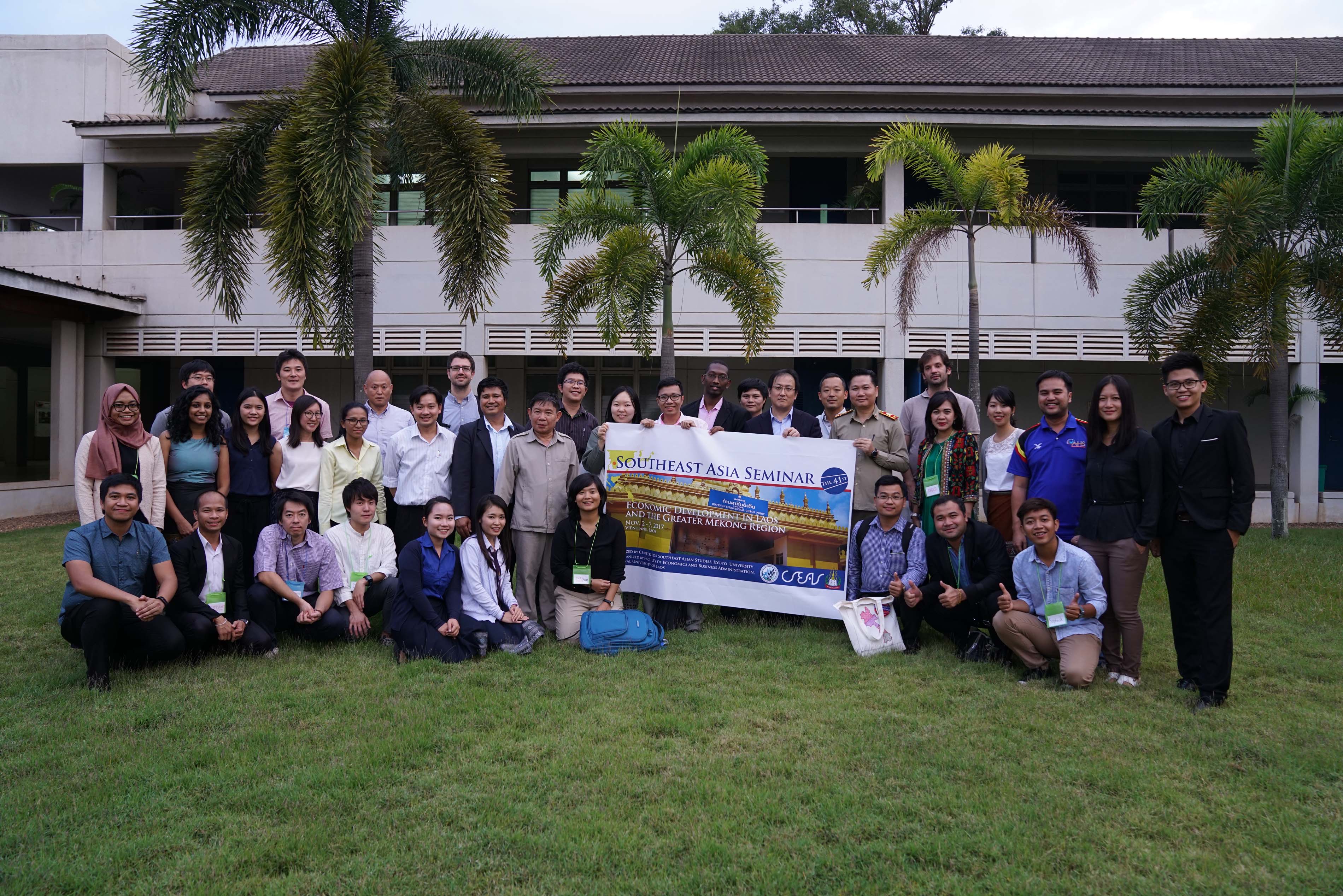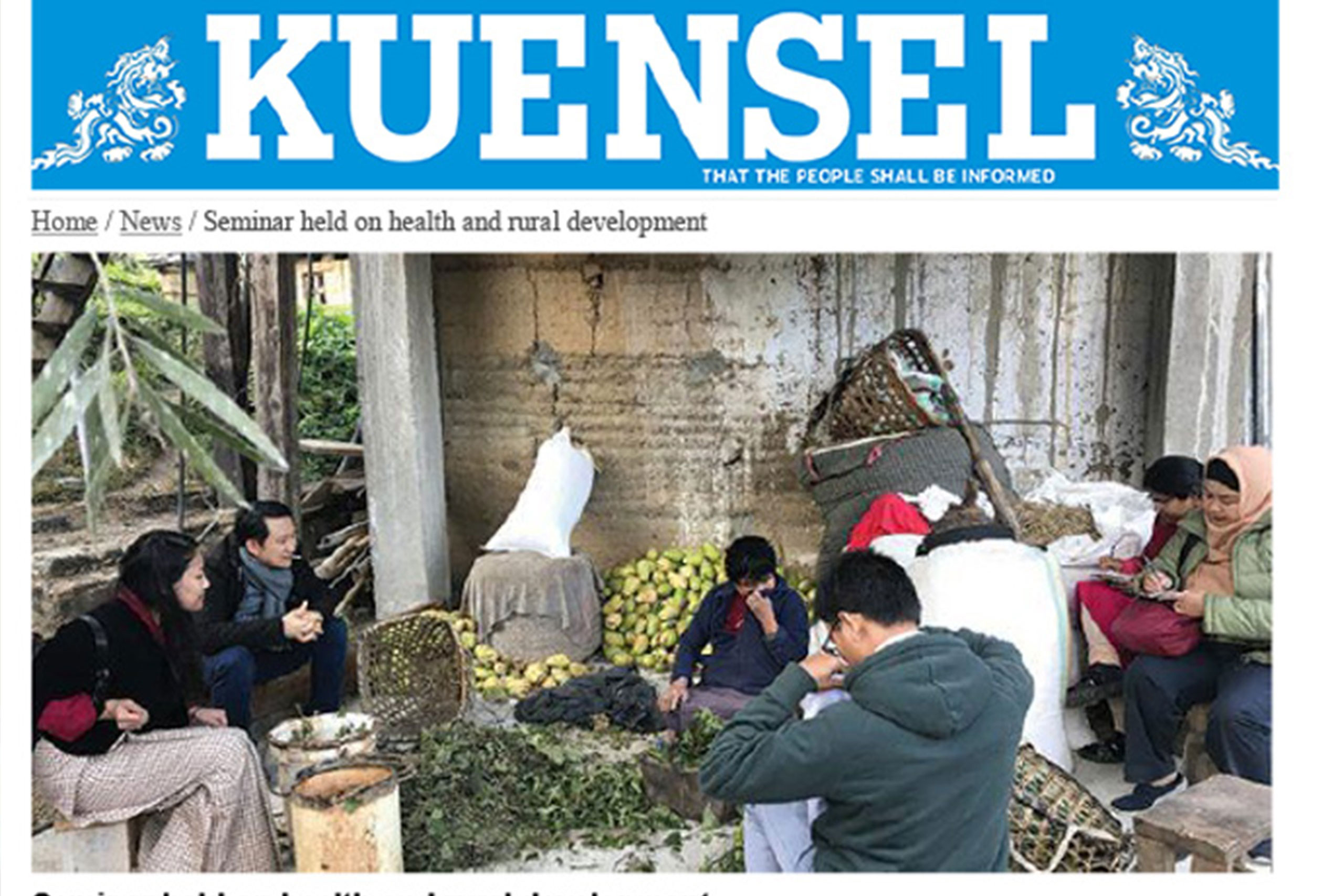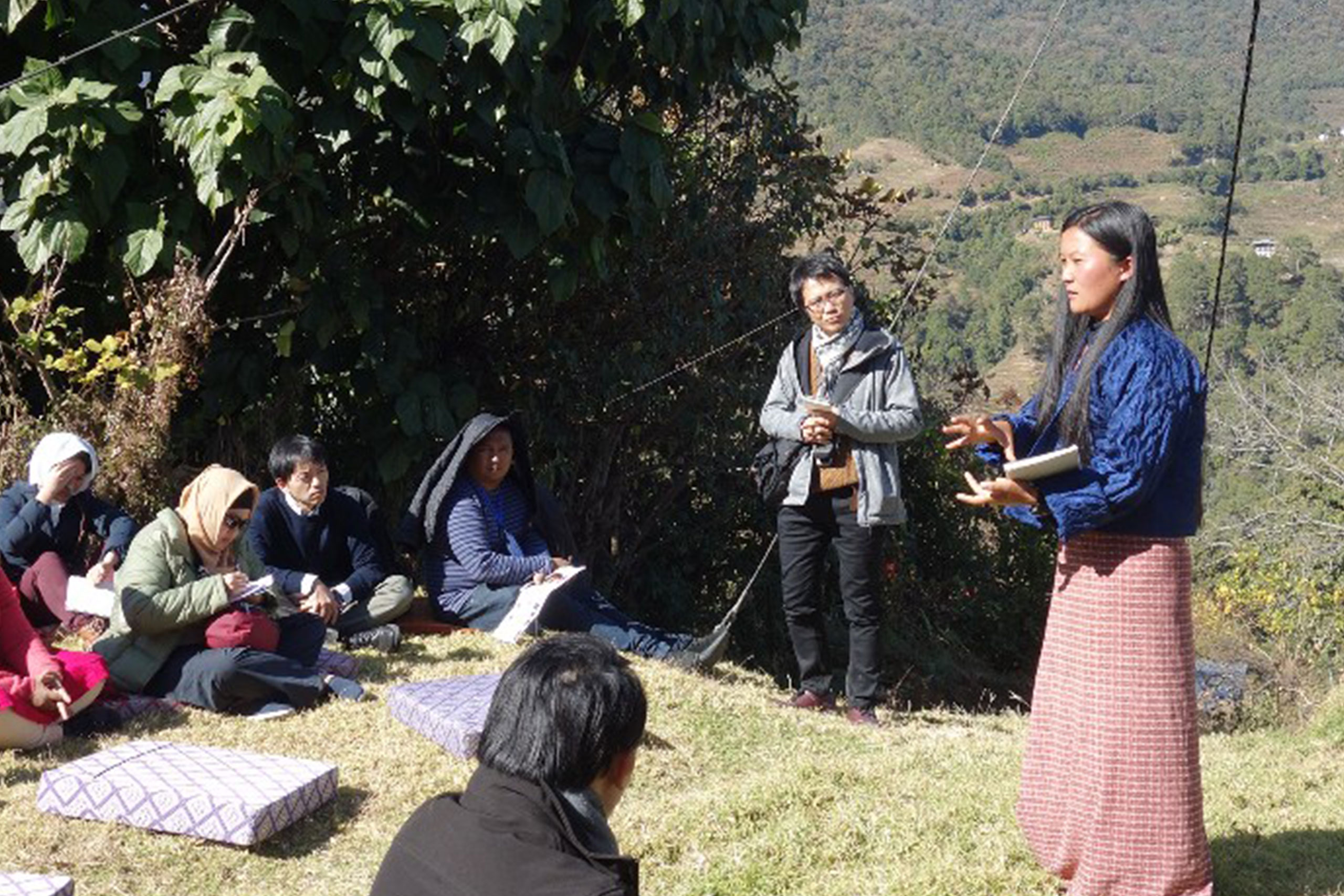The 45th
Southeast Asia Seminar
Engaging Transdisciplinarity:
Variegated Trajectories in Southeast Asian Studies
February 18-19, 2022
Photograph by Jimmy A. Domingo
Thank you all for participating in the seminar!
Report
The 45th Southeast Asia Seminar
Engaging Transdisciplinarity:
Variegated Trajectories in Southeast Asian Studies
The 45th Southeast Asia Seminar was held as a closed meeting via Zoom on February 18 and 19, 2022. This year’s theme was “Engaging Transdisciplinarity: Variegated Trajectories in Southeast Asian Studies.” The first day of the seminar (February 18, 2022) was organized in conjunction with the annual conference of CSEAS’s Japan-ASEAN Platform – entitled “Grounded Transdisciplinary Research in Southeast Asia,” while the second day was a stand-alone seminar.
The 45th Southeast Asia Seminar sought to provide a space for reflection and comparison of varied trajectories of transdisciplinarity in Southeast Asian Studies by, firstly, presenting a selection of “case studies” of transdisciplinarity, and, secondly, encouraging a conversation between up-and-coming and senior researchers. Transdisciplinary inquiry not only requires innovative research methods, but also challenges researchers – many of whom work in relative isolation in so-called “ivory towers” – as well as professional experts – many of whom are disconnected from the broader civil society.
A total of 10 core participants from 6 countries took part in this year’s seminar, they were: Dr. Fanny Caron-Scarulli (France), Associate Researcher, IrAsia, Aix-Marseille University-CNRS; Dr. Xiaobo Hua (China), Associate Professor, China Agricultural University; Miriam Jaehn (Germany), PhD Candidate, National University of Singapore; Thiti Jamkajornkeiat (Thailand), PhD Candidate, University of California-Berkeley; Takahiro Kamisuna (Japan), Ph.D Student, National University of Singapore; Dr. Yuqing Li (China), Researcher, Institute for International and Area Studies (IIAS), Tsinghua University; Dr. Khathaleeya Liamdee (Thailand), Researcher, Institute of Asian Studies, Chulalongkorn University; Novieta Sari (Indonesia), PhD Student, Newcastle University; Dr. Chyatat Supachalasai (Thailand), Assistant Professor, Faculty of Political Science, Ramkhamhaeng University; Trissia Wijaya (Indonesia), PhD Candidate/External Consultant for UNDP, Asia Research Centre, Murdoch University.
The seminar started with Welcome Remarks by Prof. Hayami Yoko, director of CSEAS, Kyoto University, followed by the introduction to the seminar by Assoc. Prof. Decha Tangseefa, the chair of the seminar committee. After the morning session of getting to know one another and a preliminary discussion on transdisciplinarity, the afternoon session was lined up with 8 presentations from 8 research projects, directly or indirectly supported by the Japan-ASEAN Platform.
The first session was comprised of four presentations: Dr. Cypri Jehan Paju Dale (Post-doctoral Researcher, CSEAS) “We, the Twins of the Dragons”: Indigenous Knowledge and Decolonization of Human-Animal-Environment Relations in Komodo National Park, Indonesia”; Program-specific Assistant Professor Dr. Julie Ann de los Reyes (CSEAS) “Rethinking transdisciplinarity: Power, conflict and alternatives in Philippine energy transition”; Assistant Professor Dr. Miles Kenney-Lazar (National University of Singapore) “In the 'development soup': Conflicted ethnography in an extractive frontier”; Junior Associate Professor, Dr. Hart N. Feuer, (Graduate School of Agriculture, Kyoto University) “Co-creating Ecological Entrepreneurship: The Intersection of Transdisciplinary Methods and Experimentation.” Prof. Takeshi Ito from Sophia University was the discussant.
The second session was also comprised of four presentations: Dr. Kwan Soo Chen (National University of Malaysia) “Health impacts from TRAPs and carbon emissions in the projected electric vehicle growth and energy generation mix scenarios in Malaysia”; Dr. Chika Yamada (Post-doctoral Researcher, CSEAS) “Peer involvement in formal care services for people with substance use disorders in Indonesia”; Associate Prof. Ian A. Navarrete (Department of Environmental Science, Southern Leyte State University) “Coping with soil degradation from a transdisciplinary perspective: insights from marginal upland farmers in Southern Leyte, Philippines”; Associate Prof. Moises Neil V. Seriño (Department of Economics, Visayas State University) “Valuing the Role of Mangroves in Protecting Coastal Communities from Super Typhoons in the Philippines.” Associate Prof. Decha Tangseefa (CSEAS) was the discussant.
On the second day, based on more than fourteen assigned readings and the presentations and discussions on the first day, the core participants presented the results of their interweaving of insights from the readings, from the presentations, and from their own research journeys. The discussions covered multiple strands of ideas, some key of which were:
• An intertwining relation of disciplinarity, area studies, and transdisciplinarity
• Critical stances on the scientific discourse vis-à-vis knowledge of the marginalized
• Toward “problem-solving”: bridging the academic and the non-academic worlds
• Knowledge co-production vis-à-vis the locations of “stakeholders”
• Dilemma, tension, friction, conflict: transdisciplinarity’s unavoidable textures
• From epistemological engagements to ethical conundrums
• Decolonizing transdisciplinarity?
With such strands of ideas and through varieties of objects of study within each core participant’s research endeavor – e.g., border and disease, land use, infrastructure, refugee, the ecosphere, indigenous people, left internationalism, among others – the core participants’ methods, approaches or analytical frameworks were, likewise, diverse: ethnographic research; configurational analysis; intersectionality; philosophy; philology, linguistic and/or literary analyses; new interpretive method, among others. The second days’ presentations and discussions were rich, often exciting, and some were impressively deep. A wide variety of issues, therefore, followed.
The notion of “stakeholders” and their positionalities through certain forms of transdisciplinary inquiries were underlined by some core participants. In the process, various identity contrarieties were articulated or alluded to through the subaltern-hegemonic nexus – e.g., gender (female vis-à-vis male), class (the poor vis-à-vis the rich), nation (indigenous people vis-à-vis the state), literacy (the illiterate vis-à-vis the literate), and life (the ecosphere vis-à-vis the human). Hence, for any transdisciplinary researcher aiming to come to grips with such complex societal and/or planetary landscapes of “stakeholders,” epistemological engagements are inevitable. Moreover, they must also be prepared to grapple with a bewildering array of ethical conundrums resulting from those complicated terrains of positionalities.
Furthermore, some of the core participants inquired whether transdisciplinarity could be employed as an agenda to break the status quo, while others emphasized that transdisciplinarity had to steer clear from any possibilities of colonizing practices, which also included the silencing of marginalized voices or the erasure of their knowledge or worldviews. Some of them, therefore, called for: a) academics’ collaborations with marginalized people; and b) creating spaces for alternative forms of knowledge, which have long been negated or overlooked by mainstream scientific institutions. In effect, the notion that (hi)stories of the marginalized must be (re)written becomes vital. And if transdisciplinarity is to become more imperative as a modus operandi for solving complex societal and planetary problems or crises, some core participants inquired about some effective ways of training transdisciplinarity to the new-generation researchers.
The 45th Southeast Asia Seminar was organized by a ten-member team consisting of: four senior researchers (Kobayashi Satoru, Michael Feener, Sakamoto Ryota, and Decha Tangseefa); four young researchers (Tsuchiya Kisho, Theara Thun, Matsuoka Sachi, and Takamichi Serizawa); and two staff members (Akedo Masako and Kondo Motoko). The committee would like to express its sincere gratitude to: firstly, the Japan-ASEAN Platform for allowing this year's SEA Seminar to be organized in conjunction with the Platform's annual conference; secondly, the CSEAS staff who supported the seminar activities along the way, especially Kamata Kyoko and Kawashima Junko; and lastly, but not least, Brian Richardson.
Decha Tangseefa
On Behalf of the 45th SEA Seminar Committee
March 9th, 2022
Paper Presenters
Eight up-and-coming young researchers presented their research papers. For speaker’s abstract and bio, please click each 'pdf' button.
Southeast Asia Seminar
The 45th Southeast Asia Seminar on
Engaging Transdisciplinarity:
Variegated Trajectories in Southeast Asian Studies
Center for Southeast Asian Studies at Kyoto University, Japan
Via Zoom
February 18, 2022, from 11 a.m. to 6:30 p.m.
(Japan Standard Time/GMT+9:00)
February 19, 2022, from 9 a.m. to 12:30 p.m. (JST)
*The seminar is not open to the public.
Since the end of the 1990s, transdisciplinarity has gained more currency as a research approach based on collaborative endeavor, aiming not only to foster meaningful knowledge co-production, but also to solve complex societal and planetary challenges, while also endeavoring to close the gap between the academic and the non-academic spheres. The first special issue of any ISI peer reviewed journal on this inquiry was published by Elsevier in Futures in 2004, when transdisciplinarity was a buzzword championed by a small number of academics. In 2015, another special issue of Futures was published. Based on the proliferations of contributions on transdisciplinarity, the 2015 issue both assessed transdisciplinary inquiry a decade earlier and examined its prospects.
Since then, transdisciplinary research has become an integral approach in multiple research fields and topics such as the Anthropocene; climate science and sustainability science, deaf anthropology; disease and Human/Animal Interactions; energy-water-food nexus; evolution biology; mammal conservation and geopolitics; molecular pathology and epidemiology; public health law; and sociopolitical legal studies, among others.
Within this academic context, the 45th Southeast Asia Seminar seeks to provide a space for reflection and comparison of variegated trajectories of transdisciplinarity in Southeast Asian Studies by, firstly, presenting a selection of “case studies” of transdisciplinary research, and, secondly, encouraging a conversation between up-and-coming and senior researchers. Transdisciplinary inquiry not only requires innovative research methods, but also challenges researchers – many of whom work isolated in the so-called “ivory towers” – as well as professional experts – many of whom are disconnected from civil society. Thus, the basic questions that will open the two-day event are:
● What are the purposes of transdisciplinary contributions?
● Who should participate?
● What methods can be used?
Moreover, inspired by the 2015 special issue of Futures, the following four issues will not only figure prominently in this year’s Southeast Asian Seminar, but will also be employed as entry points for the seminar’s exploration on transdisciplinary inquiry since 2015, especially in regard to Southeast Asian Studies:
● Discourses of Transdisciplinarity
● Hidden Agendas, Positionality, and “Stakeholders”
● Collaborative Processes & Knowledge Production
● Methods of Synthesis: Implementation
The 45th Southeast Asia Seminar on
Engaging Transdisciplinarity:
Variegated Trajectories in Southeast Asian Studies
Center for Southeast Asian Studies at Kyoto University, Japan
Via Zoom
February 18, 2022, from 11 a.m. to 6:30 p.m.
February 19, 2022, from 9 a.m. to 12:30 p.m.
(Japan Standard Time/GMT+9:00)
*The seminar is not open to the public.
- 11:00-11:05
Welcome Remarks by Hayami Yoko, Director, Center for Southeast Asian Studies (CSEAS Kyoto University)
Moderator: Decha Tangseefa (CSEAS Kyoto University) - 11:05-11:15
Introduction to the 45th Southeast Asia Seminar by Decha Tangseefa, Chair, Southeast Asia Seminar Committee (CSEAS Kyoto University) - 11:15-11:35
Self-introduction of Seminar Participants (1-2 minutes each)
Moderator: Decha Tangseefa (CSEAS Kyoto University)
- 11:35-12:30
Preliminary Discussion on Transdisciplinarity
Moderator: Decha Tangseefa (CSEAS Kyoto University)
- 12:30-13:30
Lunch Break - 13:30–13:50
Opening Remarks by Noboru Ishikawa (CSEAS Kyoto University),
Mario Ivan Lopez (CSEAS Kyoto University) - 13:50-14:10
Presentation 1: Cypri Jehan Paju Dale (CSEAS Kyoto University)
"We, the Twins of the Dragons”: Indigenous Knowledge and Decolonization of Human-Animal-Environment Relations in Komodo National Park, Indonesia." - 14:10-14:30
Presentation 2: Julie Ann de los Reyes (CSEAS Kyoto University)
"Rethinking transdisciplinarity: Power, conflict and alternatives in Philippine energy transition" - 14:30-14:50
Presentation 3: Miles Kenney-Lazar (National University of Singapore)
"In the “development soup”: Conflicted ethnography in an extractive frontier" - 14:50-15:10
Presentation 4: Hart N. Feuer (Kyoto University)
"Co-creating Ecological Entrepreneurship: The Intersection of Transdisciplinary Methods and Experimentation" - 15:10-15:30
Discussant: Takeshi Ito (Sophia University) - 15:30-15:50
Q&A - 15:50-16:05
Coffee Break - 16:05-16:25
Presentation 1: Kwan Soo Chen (National University of Malaysia)
"Health impacts from TRAPs and carbon emissions in the projected electric vehicle growth and energy generation mix scenarios in Malaysia" - 16:25-16:45
Presentation 2: Chika Yamada (CSEAS Kyoto University)
"Peer involvement in formal care services for people with substance use disorders in Indonesia" - 16:45-17:05
Presentation 3: Ian A. Navarrete (Southern Leyte State University)
"Coping with soil degradation from a transdisciplinary perspective: insights from marginal upland farmers in Southern Leyte, Philippines" - 17:05-17:25
Presentation 4: Moises Neil V. Seriño (Visayas State University)
"Valuing the Role of Mangroves in Protecting Coastal Communities from Super Typhoons in the Philippines" - 17:25-17:45
Discussant: Decha Tangseefa (CSEAS Kyoto University) - 17:45-18:05
Q&A - 18:05-18:10
Closing Remarks by Mario Ivan Lopez (CSEAS Kyoto University) - 18:10-18:15
Group photo - 18:15-18:30
Southeast Asia Seminar: Reflection on the Frist Day
Moderator: Decha Tangseefa (CSEAS Kyoto University)
DAY 1: February 18
Morning Session
Afternoon Session (Presentations)
ASEAN Research Platform Annual Meeting FY 2021/2022
Center for Southeast Asian Studies (CSEAS), Kyoto University
Grounded Transdisciplinary Research in Southeast Asia —a Book project
< Session 1 >
Moderator: Chika Yamada
< Session 2 >
Moderator: Cypri Jehan Paju Dale
- 9:00-9:05
Morning greetins by Decha Tangseefa, Chair, Southeast Asia Seminar Committee (CSEAS Kyoto University) - 9:05-10:20
Moderator: Theara Thun
Timekeeper: Kisho Tsuchiya
Group A
• Yuqing Li (Institute for International and Area Studies (IIAS) of Tsinghua University)
• Khathaleeya Liamdee (Institute of Asian Studies, Chulalongkorn University)
• Xiaobo Hua (China Agricultural University)
• Trissia Wijaya (Asia Research Centre, Murdoch University)
• Miriam Jaehn (National University of Singapore)
- 10:20-11:35
Moderator: Takamichi Serizawa
Timekeeper: Sachi Matsuoka
Group B
• Novieta Sari (Newcastle University, UK)
• Takahiro Kamisuna (National University of Singapore)
• Chyatat Supachalasai (Faculty of Political Science, Ramkhamhaeng University, Bangkok Thailand)
• Fanny Caron-Scarulli (IrAsia, Aix-Marseille University-CNRS)
• Thiti Jamkajornkeiat (University of California-Berkeley)
- 11:35-11:40
Coffee Break - 11:40-12:10
Presentations by Committee Members: Four Transdisciplinary Journeys
• R. Michael Feener
• Satoru Kobayashi
• Ryota Sakamoto
• Decha Tangseefa
- 12:10-12:25
Open Discussion - 12:25–12:30
Closing Remarks by Decha Tangseefa, Chair, Southeast Asia Seminar Committee (CSEAS Kyoto University)
Day 2: February 19
Morning Session
< Presentations by seminar participants >
(10 minutes each, followed by 5 minutes of Q&A)
Note: Please note that the time zone indicated in the schedule is based on Japan Standard Time (GMT+9).
Since 1977, CSEAS has brought together junior and senior researchers to learn and exchange ideas about Southeast Asian studies and related area studies through its annual “Southeast Asia Seminar.” In 2009, with the 33rd installment, the seminar switched to an all-English format, started including lecturers from outside Japan, and began organizing each seminar in different countries in Southeast Asia and beyond, with young researchers applying from all over the world. The theme of FY2020’s seminar, which was held as a Webinar, was “The Covid-19 Pandemic in Japanese and Southeast Asian Perspective: Histories, States, Markets, Societies.”
In deciding each annual theme, CSEAS incorporates a variety of disciplinary perspectives, paying special attention to “cross-fertilize” ecological, biological, or medical perspectives with social science and humanities approaches, so as to capture changing dynamics at both local and national levels. In addition, CSEAS organizes the seminars from local points of view, closely engaging with its partner institutions in field-site countries. This adds an educational and training aspect to the collaborations that have already been developed through the Center’s past research endeavors.
Through the years, the seminar has gradually shifted from a lecture-based format to a more participatory one that includes a combination of lecture, field visit, and group work. This gives the participants an opportunity to engage with lecturers, fellow participants, and local societies in multi-faceted learning processes, amid each site’s specific environment and natural setting. The participants—Southeast Asians, Japanese, and others—are therefore able to learn together and enrich one another in a unique atmosphere. Consequently, the “Southeast Asia Seminar” has, since its inception, not only helped to foster the regions' next generation of researchers, but also has expanded both academic and non-academic networks in Southeast Asia, Japan, and beyond.
Past Seminars
Look at selection of our history
(For more information on CSEAS Kyoto University’s long history of the Southeast Asia Seminars,
please visit here.)
Contact
For inquiries, please e-mail.
*Please indicate your inquiry and name in the subject line of your e-mail.
e.g., SEA Seminar_change request_your name
